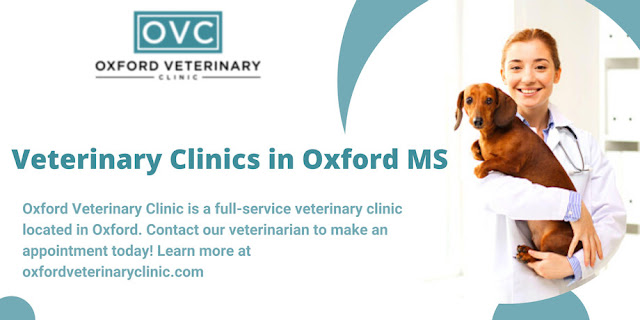Everything You Need To Know About Veterinarians | Best Vet Clinic
When it comes to veterinarians, there are many veterinary medicine career options. Many veterinary pursue careers working with animals, but there are many other types of veterinarians. This is a list of all the possible career paths within this field. To get a better idea of the career options available in veterinary medicine, familiarize yourself with them all. It is easy to spend hours on the internet looking for information about different career options for Veterinary Clinics in Oxford MS. We can help reduce your workload. Here are some important veterinary jobs you should be aware of.
Types of Veterinarians You Should Know
Companion Animal-Veterinarians
Although they are only one group of veterinarians, companion animal vets make up the majority. About 75 percent of private-practice veterinarians in any Oxford Animal Hospital work with companion animals.
These small-animal veterinarians are akin to primary care doctors who treat patients. They can diagnose and treat injuries, perform surgeries, prescribe medication, and administer vaccines.
Veterinary Specialists
Veterinarians can choose from many specialties, just like doctors who work with patients. Anesthesiology and dentistry are some of the career options. Any Veterinary Clinics in Oxford MS can also choose to specialize in one or more species of animal, such as cats, dogs, birds, and wildlife. Vet specialists are consultants for other vets who require a specific type of equipment or expertise. Each role requires different skills, so daily tasks will differ greatly between specialties.
Many Oxford Animal Hospital explains that a veterinary pathologist focuses his attention on animal disease.
Food-Animal Veterinarians
Food animal veterinarians are responsible for the safety of food animals that have been raised for human consumption. However, many large-animal vets are not required to do so. Regardless of their focus, the AVMA says that these vets are responsible for the welfare and prevention of disease in food animals. They might work on farms or ranches, but they also spend a lot of time traveling.
Food Safety And Inspection Veterinarians
Both food animal veterinarians, as well as food safety and inspection vets, have roles to play in keeping edible products safe. However, they are not always the same. Many experts point to the fact that they often collaborate with the Food Safety and Inspection Service to enforce regulations.
These veterinarians can inspect animals and their products to make sure they are safe. They might have to quarantine infected animals in order to prevent the disease from spreading to humans. Others are responsible for ensuring the safety of medication and additives.
Research Veterinarians
Strong scientific knowledge is essential for every DVM, but it’s even more crucial for research veterinarians. A career overview by many experts shows that these veterinarians could work for universities, government agencies, and biomedical research companies. Often, vets who work in education institutions teach vet students.
Schools and government agencies may ask veterinarians for a review of previous findings and methods to help develop better ways to diagnose, treat, and prevent certain health conditions. Pharmaceutical and biomedical workers create and test drugs and other biomedical products.
Education and Training
A Doctor of Veterinary Medicine degree must be obtained from an accredited veterinary college.
Education
For veterinarians, a Doctor of Veterinary Medicine (DVM) or VMD degree is required. A typical four-year program in veterinary medicine includes classroom, laboratory, and classroom components.
It is not easy to get into veterinary school. A majority of applicants to veterinary school hold a bachelor’s degree. Most veterinary medical colleges require that applicants have taken many science courses, including biology, animal science, and chemistry. Many programs require students to have taken math, social science, and humanities courses.
Some veterinary medical schools prefer applicants who have worked with veterinarians in clinics or with animals on farms or shelters.
The anatomy and physiology, and treatment of diseases in animals are all part of veterinary medicine. Most programs include three years of classroom, laboratory, or clinical work. The fourth year of a 4-year program includes clinical rotations in a hospital or veterinary center.
Registers, Certifications, Licenses
To practice in any state, veterinarians must have a license. Although licensing requirements differ from one state to the next, all prospective veterinarians must have completed an accredited veterinary program. They also need to pass the Veterinary Licensing Examination.
Most states require veterinarians to pass the state licensing exam in addition to passing the national exam. A state license may not be required for veterinarians working in the federal or state government. This is because different government agencies have different requirements.
Each state has its own exam that covers the laws and regulations. Since few states will accept licenses from another state, veterinarians must usually take the exams required for each state.
Personality and Interests
According to the many Oxford Animal Hospital, veterinarians are most interested in the Building or Thinking areas. The Building area is a strong interest in working with machines and tools, as well as making and fixing practical things. The Thinking interest area focuses on investigating and improving our understanding of natural laws.
To determine if you have a Building or Thinking passion that might be compatible with a career in veterinary medicine, take the career test.
These are the qualities that veterinarians need to possess:
Compassion. Veterinarians should be kind and compassionate with both animals and their owners. They must show kindness and respect to animals and be sensitive when dealing with owners of sick pets.
Decision-making skills. Veterinarians need to decide how to treat injuries and illnesses. It can be difficult to decide whether or not to kill a sick animal.
Problem-solving skills. Veterinarians must have strong problem-solving abilities because they must determine what is wrong with an animal. Excellent diagnostic skills are also required for those who perform animal tests to assess the effects of drug therapies.
Management skills. Management is essential for veterinarians who manage private clinics laboratories or supervise inspectors and technicians. They are responsible for providing direction and delegating work as well as overseeing the day-to-day operations.
Communication skills. Oxford MS Veterinarian must communicate clearly with their clients and their staff.



Comments
Post a Comment